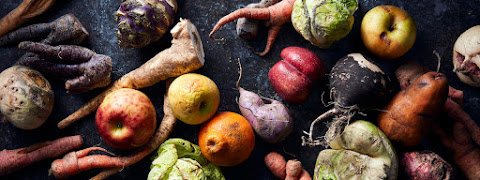Waste Not, Want Not.
Hello again. It seems we're back this week to discuss on another pressing global issue. An issue that doesn't really come to mind when we visualize a problem the entire world is struggling with: food wastage.
Let's open up our discussion with a fun fact. Did you know that the amount of food wasted by Malaysians is enough to feed 12 million people a day? Not such a fun fact, but a fact nonetheless. Want another not-so-fun fact? 66 million children in the world go to school hungry. That does put a lot into perspective, doesn't it? If you have the slightest bit of empathy, you'd probably want to start learning how to reduce that wastage. If you're like me and a complete beginner at saving the planet, no worries, you've stumbled upon the perfect post to start.
Admittedly, the only tip I knew on how to reduce food wastage before writing this blog is to simply finish your food. A sound tip, logical in the sense that if there's no food left over = no food thrown away. But to live is to consume, so here are a few other tips you can adopt to should you feel like playing a bigger part in reducing Malaysia's food wastage problem.
1. Shop smart, not hard.
Have you ever felt like you just needed to buy that one vegetable but it just ends up taking space in your fridge and you throw it out anyway? That's alright, but noting to yourself what happened the last time you decided to try it would help decrease the waste pile, even just a bit. Another great precaution is making frequent trips to the grocery store instead of bulk shopping. Not only does this reduce waste, it also saves money! Win-win situation at its best. If you make a list of what to buy and stick to that list only, that would help avoid unnecessary spending too. The key here is to think forward, and not be swayed by your impulses.
2. Storing and Preserving
Who says you have to throw the whole block of cheese out when a little mold appears? Apparently there is a difference between mold in 'hard' food and 'soft' foods. With hard foods like cheese and hard salami, you can just pick out and remove the moldy parts and the food will be safe to consume again. Soft foods like rice or sauce though, should be discarded as soon as a bit of mold appears. This has to do with the science of the mold being able to spread faster with soft foods.
Besides that, pickling or fermenting your food can be a great money saver too. Besides being economically and environmentally friendly, they're also really delicious and last longer. If you're completely clueless on how exactly to pickle your food, here is a great tutorial that explains the process really well.
Another tip on the same note is storing and using up your leftovers. However, think of all those times where you store your leftovers in the fridge and you end up forgetting about them, End of the day, you throw them out anyway, right? A tip to try is rather than in an opaque container, try storing leftovers in a clear glass container. With a glass container, you can see the food, so this helps ensure you don’t forget the it.
Speaking of fridges, keeping your giant ice box clean and decluttered helps in reducing food waste too. Think about it, if your fridge is messy and unorganized, how are you ever going to remember to use the food there? It's as if it's out of sight, out of mind. So for the sake of the planet, clean your fridge. A great method to use is the First In, First Out method, which basically just means that you store your most recent purchases at the back instead of the front, so the more time a food has stayed in your fridge, the closer it is to the door.
3. One mans trash is another's treasure.
For those of you who would like to drink more water but cant stand the taste (or lack thereof) of it, I have some good news for you. The vegetable peels or lemon skin can be added to your water to make it taste better. So in normal circumstances where you discard your apple peels or orang zest, why not add a little something to your water for that extra kick?
The same kind of thinking can be used for other organic matter too. Drink coffee every day so you have a lot of leftover coffee grounds? Why not repurpose it as a fertilizer for your dying plants? Don't know what to do with your pumpkin seeds? Bake them with some olive oil and salt for a great healthy snack. The main point is to get creative with your ideas, and most importantly, have fun while saving the planet.
As a closing, I would like to reinstate the importance of being sustainable with our consumption. One third of all the food we grow is wasted. If we don't start decreasing that pile, we may run out of places to dump all that waste so we can pretend to not know about it.
P.S: If you're a visual learner, here's what I'm trying to say in a nutshell:
Until next time, friends.



Comments
Post a Comment